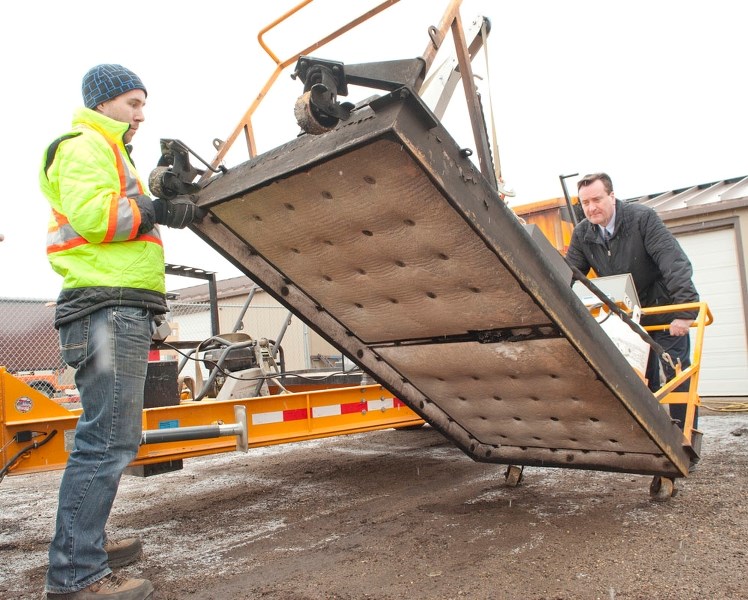St. Albert streets will get a lot cleaner this month now that sweepers have rolled out to scrub them clean.
They're also getting a lot smoother, thanks to the city's ongoing use of a giant heat lamp.
Public works staff rolled out the street-sweepers in downtown St. Albert Monday night to clean up all the sand and gravel dumped there over the winter.
The city spreads about 4,000 cubic metres of sand and gravel on its streets each winter for traction, the city's Environment and Sustainability department estimates. Sweeper trucks prowl the streets each spring to recover and recycle as much of this grit as possible before it washes into the Sturgeon River.
Sweeper teams will finish downtown before moving onto collectors, arterials and residential streets, said Jim Dinwoodie, manager of operations for roads and sidewalks.
Expect to see about four sweeper trucks out at any one time from 9 p.m. to 6 a.m. and 7 a.m. to 5 p.m., Dinwoodie said. Crews hope to reach residential streets by April 13, and will put signs up asking residents to move their cars before the sweepers arrive.
Sturgeon Heights will be the first residential area swept this year, Dinwoodie said. Mission will be the last.
The whole city should be swept by May 8. Crews plan to collect about 5,500 tonnes of sand to be recycled in Edmonton.
Big heat lamp
Running just ahead of the sweeper teams is the city's spray-injector, which uses gravel and asphalt to fix potholes in minutes, Dinwoodie said. The sweepers clean up any extra gravel left over from the repairs.
The Edmonton region got about 25 per cent more freeze-thaw cycles in the last few months than it normally gets, which has made this a bad year for potholes, said Hugh Donovan, construction service engineer and asphalt researcher with the City of Edmonton.
"At of the end of February we'd already done 65,000 in the City of Edmonton," he said, compared to about 10,000 for a typical winter at that time of year.
St. Albert has bought a new device called an infrared asphalt recycler to help with this year's pothole repairs, Dinwoodie said. While the device doesn't arrive until the end of this month, crews have been using an identical rental unit since February at a cost of about $500 per day of operation.
Regular pothole repairs involve shovelling asphalt into a hole and surrounding it with tar, Donovan said. But once the tar fails, water gets in, freezes, and pops the patch out of the hole. Spray-injectors get around this by sealing the hole shut with gravel and liquid binder, but they don't work well in the winter, as it's tough to keep the binder fluid in the cold.
The roughly $61,000 infrared recycler uses a three-by-six foot heat pad to blast a large area around a pothole, temporarily liquefying the asphalt and causing it to spew white smoke, Dinwoodie said.
"It's a really, really big heat lamp."
Crews can then smooth out the road with a rake, adding new hot asphalt if needed, to fill the hole.
"The beauty of this thing is that it works at any temperature," Dinwoodie said, even in the winter – it just takes longer to heat up.
Public works operator David Mitchell says he's used the device for three weekends and found that it's very effective. Whereas a traditional pothole patch can fail in as little as a day, the patches they've applied on Campbell Road with this device have lasted months.
"It's almost like a permanent new road."
Asphalt recyclers create a better bond between the old and new asphalt and vaporize any water in the pothole, reducing the risk of cracks, Donovan said.
Edmonton tried this technology before and found it was impractical for that city, Donovan said – it does one hole at a time and takes 10 minutes to warm up the street, and Edmonton has a huge amount of potholes.
Still, this system could work in St. Albert, as it has fewer streets, he continued.
"It's a great way of filling a pothole."
Street sweeping
City crews are now sweeping grit from St. Albert streets. They'll do major roads this week and collectors next week before moving into residential zones.
Residential areas will be swept in this order:
Sturgeon Heights, Forest Lawn, Lacombe Park, North Ridge, Akinsdale, Pineview, Braeside, Deer Ridge, Inglewood/Ironwood, Erin Ridge, Woodlands, Kingswood, Oakmont, Heritage Lakes, Grandin, Mission.
Call public works at 780-459-1557 for details.




